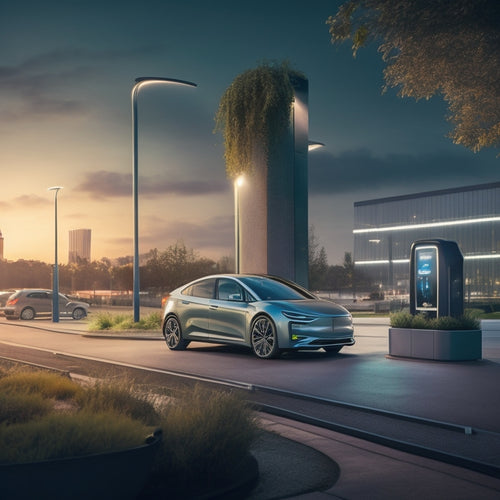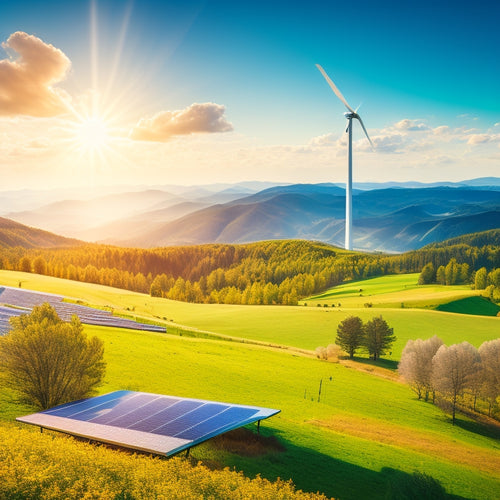
Empowering Your RV With Renewable Energy Solutions
Share
When you enable your RV with renewable energy solutions, you can camp anywhere, free from grid limitations, with a reliable and eco-friendly energy solution. To get started, calculate your total power needs based on appliance wattage and usage frequency, and examine your energy usage patterns to size your solar system accurately. Then, select the right equipment, including solar panels, an inverter, and a charge controller, to guarantee a reliable and efficient off-grid energy system. As you make the shift to renewable energy, you'll want to learn more about DIY solar panel installation, battery selection and maintenance, and maximizing energy efficiency to ascertain you have power when and where you need it.
Overview
- Off-grid solar power systems enable RV owners to camp anywhere, free from grid limitations, with a reliable and eco-friendly energy solution.
- Accurate calculation of total power needs and energy usage patterns ensures a properly sized solar system for efficient energy supply.
- Selecting the right equipment, including compatible batteries and an inverter, is crucial for a reliable and efficient off-grid energy system.
- Proper installation of solar panels, including securing the mounting system and attaching panels, ensures a safe and efficient energy harvesting system.
- Implementing energy conservation measures, such as load management and energy-efficient appliances, maximizes energy efficiency and availability.
Solar Power for RVs
When venturing off the grid, RV owners often find themselves reliant on noisy, polluting generators or limited by the availability of campsites with electrical hookups.
You can break free from these constraints by utilizing the power of the sun. With off-grid solar power, you can camp anywhere, free from grid power limitations and enjoy the freedom to boondock in remote locations.
Solar power for RVs is a reliable and eco-friendly solution, offering you the freedom to camp wherever you want.
You'll need to evaluate the type of solar panel that suits your needs, such as monocrystalline, polycrystalline, or thin-film panels.
Additionally, you'll need to plan for energy storage, selecting a compatible battery type and size to store excess energy generated during the day for use at night or on cloudy days.
With the right setup, you'll be able to enjoy the great outdoors without worrying about your energy supply.
Choosing the Right Equipment
How much power do you need to keep your RV running smoothly off-grid? Calculating your energy requirements is vital in choosing the right equipment.
Consider your appliances' wattage, usage frequency, and duration to determine your total power needs. To accurately size your solar system, examine your energy usage patterns, including types and frequency of appliances, and identify daily routine and frequently used appliances peak sun hours.
Next, select an inverter that can handle your peak power demand. Inverter options range from 100 to 3000 watts, so choose wisely. A compatible charge controller is also important to regulate the flow of energy from your solar panels to your batteries.
Look for a controller that matches your panel's voltage and current output. By selecting the right equipment, you'll guarantee a reliable and efficient off-grid energy system that gives you the freedom to roam.
DIY Solar Panel Installation
You've selected the right equipment for your off-grid energy system, now it's time to install your solar panels.
First, determine the type of solar panel that best suits your RV's energy needs: monocrystalline, polycrystalline, or thin-film. Confirm the panels are compatible with your mounting system and electrical connections. When selecting your panels, consider high-efficiency panels for peak energy harvesting.
It's also essential to check the warranty and compatibility with local codes. Gather necessary installation tools, including a drill, wire strippers, and cable ties.
Begin by securing the mounting system to your RV's roof, following the manufacturer's instructions. Then, carefully attach the solar panels to the mounting system, taking care not to damage the panels or electrical connections.
Battery Selection and Maintenance
Selecting the right batteries for your RV's off-grid energy system is crucial, as they directly impact your power storage capacity and overall system performance.
When choosing batteries, consider lithium batteries, which offer higher energy density, longer lifetimes, and lower self-discharge rates compared to traditional lead-acid batteries.
To confirm you're getting the right battery for your needs, assess your daily energy usage and prioritize your appliances, as 85% of RV owners tend to underestimate their power needs.
For peak performance, you'll want to verify proper maintenance. Check your battery's state of charge regularly and avoid deep discharging.
Keep your batteries clean and secure, and monitor their temperature to prevent overheating.
Maximizing Energy Efficiency
As you optimize your RV's off-grid energy system, maximizing energy efficiency becomes critical to guarantee you have power when and where you need it.
By implementing energy conservation measures, you can greatly reduce your energy consumption. Start by identifying energy-hungry appliances and replacing them with energy-efficient alternatives.
Next, focus on load management by prioritizing your energy needs and allocating power accordingly. Consider installing an energy monitoring system to track your energy usage and identify areas for improvement.
Frequently Asked Questions
Can I Use My Rv's Existing Electrical System With Renewable Energy?
You can modify your RV's existing electrical system to work with renewable energy, exploring solar panel options that integrate with your current setup, and pairing them with suitable battery storage solutions to guarantee a seamless change.
How Do I Ensure System Compatibility With Various RV Sizes and Models?
As you traverse the open road, your RV's unique system specifications and energy requirements are like a treasure map, guiding you to compatible renewable energy solutions that guarantee seamless integration, regardless of size or model.
Are There Any Renewable Energy Solutions for RVS Without Roof Space?
You're not limited by roof space; consider portable solar panels that can be set up on the ground or on a trailer, and investigate battery alternatives like lithium-ion batteries that offer more power in a smaller footprint.
Can I Connect Multiple Renewable Energy Sources to My Rv's System?
As you venture off the grid, you're wondering: can you really connect multiple renewable energy sources to your RV's system? The answer is yes! You can seamlessly integrate solar panels, wind turbines, and more, with advanced battery management systems, giving you unparalleled freedom and energy independence.
Do Renewable Energy Systems Void My Rv's Manufacturer Warranty?
When you install a solar installation on your RV, you're likely wondering if it'll void your manufacturer's warranty. Typically, it won't, but you'll need to guarantee the installation meets manufacturer guidelines to avoid any warranty implications.
Ready to Buy
As you utilize the power of the sun, your RV converts into a guiding light of freedom, unshackled from the grid's constraints. Like a skilled navigator charting a new course, you've expertly outfitted your vessel with renewable energy solutions. Now, the open road stretches out before you, a boundless expanse of possibility. With every mile, you're writing a new chapter in the story of sustainable exploration, your RV a shining symbol of the power of innovation and self-sufficiency.
Related Posts
-

Solid State Batteries in Electric Vehicles
Solid-state batteries revolutionize electric vehicles by offering a longer lifespan and higher energy density than tr...
-

Renewable Energy Solutions to Reduce Your Carbon Footprint
To reduce your carbon footprint, adopting renewable energy solutions is key. Using solar panels or wind turbines can ...
-

Why Outdoor Solar Lighting Systems Are Sustainable
Outdoor solar lighting systems are sustainable because they utilize renewable energy, drastically reducing your carbo...


